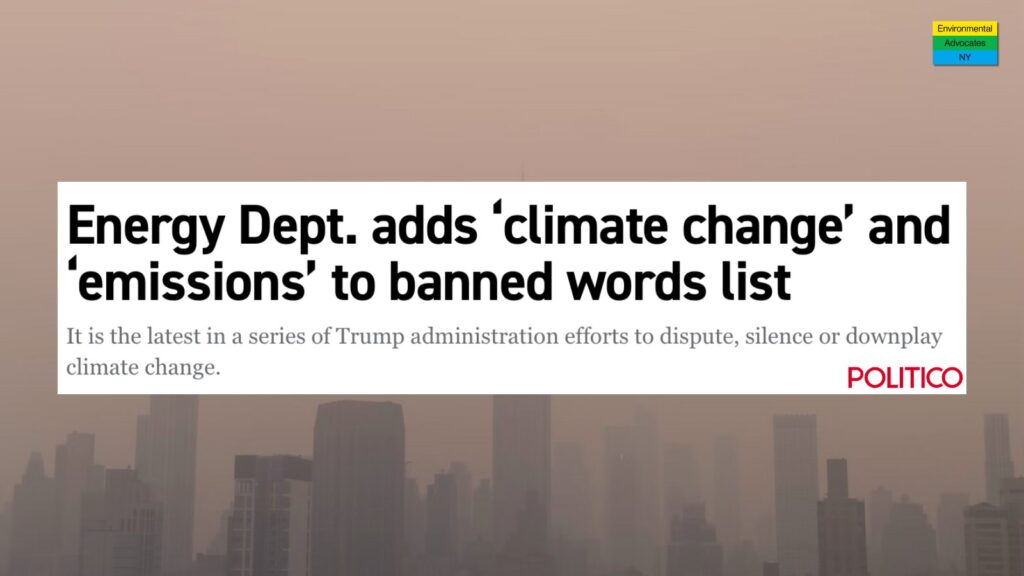The battle over language is the battle over truth—and in late September 2025, that battle intensified. Reports from multiple outlets, including Politico and NPR, revealed that the Department of Energy (DOE) under the Trump administration circulated internal guidance instructing staff to avoid using certain climate-related terms. Words like “climate change” and “emissions” were singled out, alongside others long central to scientific and environmental discourse.
This revelation marks the latest in a series of efforts by the administration to dispute, silence, or downplay the urgency of climate change, raising serious concerns among scientists, policymakers, and advocates for transparency in government.
How Real Is the List?
While the DOE officially denied creating a “banned words” list, journalists who obtained copies of the memo confirmed otherwise. The directive was circulated via email within the Office of Energy Efficiency and Renewable Energy (EERE), one of the agencies most directly tasked with developing solutions to reduce U.S. greenhouse gas emissions.
The memo instructed staff to “remove or rephrase” a dozen key terms from all public-facing materials, internal documents, reports, and even funding requests. This was not a vague suggestion—it was framed as official guidance aligned with the administration’s political priorities.
An acting external affairs director reportedly justified the changes by arguing that the terminology did not align with the administration’s messaging and goals, which have consistently favored fossil fuel expansion over renewable energy.
Which Words Were Targeted?
The guidance instructed staff to avoid using the following terms:
- “Climate change”
- “Green”
- “Decarbonization”
- “Energy transition”
- “Clean/dirty energy”
- “Carbon/CO2 footprint”
- “Sustainability” or “sustainable”
- “Tax credits/subsidies” (specifically in reference to renewables)
- “Emissions” (banned due to its “perceived negative connotation”)
For an office explicitly charged with tackling emissions and supporting clean energy initiatives, removing these words represents not just a shift in communication but a direct conflict with its mission.
What Does This Mean for Policy and Science?
The implications of such language restrictions are profound and far-reaching:
- Shifting Energy Policy: The ban reflects the Trump administration’s broader agenda to pivot away from renewables and reassert fossil fuels at the center of U.S. energy policy. By eliminating climate-focused language, the administration weakens the visibility of renewable solutions.
- Altering Communication: The guidance impacts both public and internal messaging, meaning scientific reports, funding requests, and briefing documents could be stripped of critical clarity. Without these terms, important nuances about emissions reductions, sustainability goals, and clean energy transitions may be lost.
- Impact on Research and Funding: Scientists and researchers could face hurdles when applying for grants or publishing federally supported studies. Similar restrictions have reportedly been applied in other agencies, where projects containing “unapproved” terminology were flagged or rejected.
- Erosion of Climate Action: By erasing language, critics argue the administration is attempting to erase the problem itself. Without the ability to name climate change or emissions, it becomes harder for agencies to set goals, track progress, or communicate urgency to the public.
- Chilling Effect on Scientists: Already, researchers have reported feeling pressured to self-censor, altering the way they describe projects to avoid political backlash or funding cuts. This self-censorship risks sidelining critical areas of research at a time when climate science is needed most.
Why Language Matters
Words shape policy, public understanding, and ultimately, action. Removing terms like “climate change” or “emissions” does not make the science go away—it simply obscures it. This tactic echoes past controversies, such as when government officials attempted to censor climate reports or manipulate scientific data for political purposes.
The global scientific consensus is clear: greenhouse gas emissions are driving dangerous climate disruption, and urgent action is required to mitigate the worst effects. Attempting to silence or rebrand the language only delays the solutions.
The Bigger Climate Picture
At a time when communities worldwide are facing record-breaking heatwaves, wildfires, and floods, restricting discussion of “climate change” undermines U.S. credibility and leadership on the world stage. It also sidelines the work of agencies like the EERE, which should be at the forefront of advancing clean energy and sustainability initiatives.
This controversy highlights the importance of safeguarding scientific integrity and ensuring that federal agencies remain free to communicate facts openly. The stakes are too high for censorship.
For a deeper look into climate policy, clean energy, and the ongoing fight to protect science from political interference, explore Sustainable Action Now’s Climate Network.
The DOE’s reported “banned words” list is more than a bureaucratic detail—it is a symbol of a broader effort to weaken climate action through silence and denial. By discouraging the use of critical terms like “climate change” and “emissions,” the administration risks delaying the urgent work needed to protect communities, ecosystems, and future generations.
Language matters because it frames reality. If the words vanish, so too can the urgency. That is why protecting scientific truth—and insisting on clear, honest communication—is an essential part of fighting the climate crisis.


